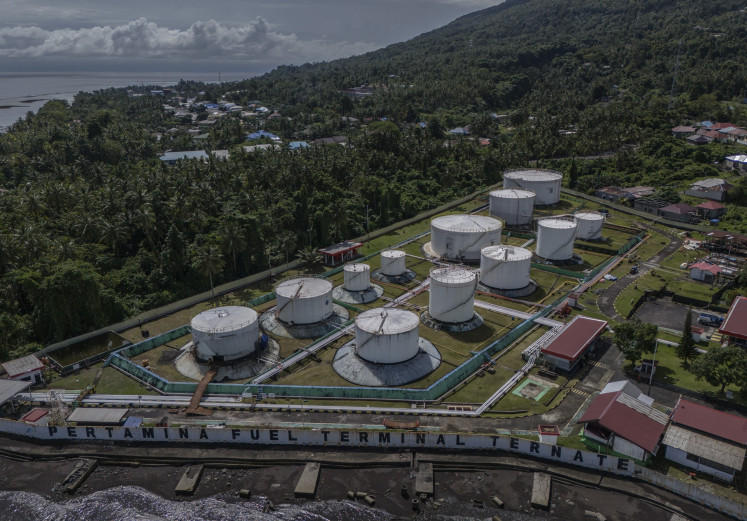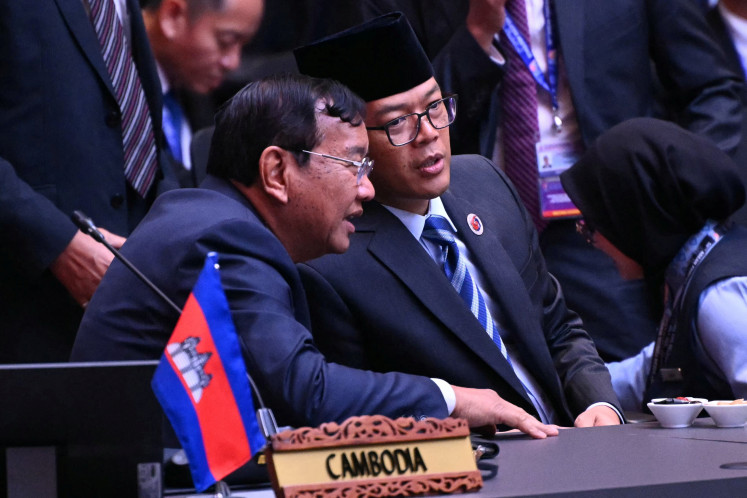Popular Reads
Top Results
Can't find what you're looking for?
View all search resultsPopular Reads
Top Results
Can't find what you're looking for?
View all search resultsRI athletics worried over shared use of Madya Stadium
Sports center: Madya Stadium is seen with Gelora Bung Karno Main Stadium in the background at the Gelora Bung Karno sports complex in Senayan, Central Jakarta, on Wednesday
Change text size
Gift Premium Articles
to Anyone
S
ports center: Madya Stadium is seen with Gelora Bung Karno Main Stadium in the background at the Gelora Bung Karno sports complex in Senayan, Central Jakarta, on Wednesday.(JP/Dhoni Setiawan)
Despite being one of the country’s few sports federations to have garnered international praise, the Indonesia Athletics Association (PASI) has been required to share its main training facility, raising concerns that the move would hinder the organization’s ability to foster rising talents such as Lalu Muhammad Zohri, Southeast Asia’s fastest sprinter.
The federation has been using Madya Stadium at the Gelora Bung Karno (GBK) sports complex in Senayan, Central Jakarta, almost exclusively as a national training ground to groom athletes in track and field events. However, it was announced last week that it would have to share the facility with top-flight soccer team Bhayangkara FC, which means having to adjust a complex training schedule and finding another venue when soccer matches are being held.
“It’s not easy for us to conduct a smooth training program while the [government] demands us to accomplish more,” PASI secretary-general Tigor Tanjung told journalists recently, hinting that the plan would be troublesome.
The Jakarta-based soccer club will only use Madya for certain home matches, but PASI is reportedly unhappy with the plan.
To prevent a full-fledged conflict, the Youth and Sports Ministry stepped in by inviting representatives of PASI, the GBK sports complex management (PPKGBK), Bhayangkara FC and several other sports federations — including the Indonesian Tennis Association — to a meeting on Tuesday to find a solution.
In the meeting, Bhayangkara FC emphasized once again that it would be using Madya only when necessary.
Bhayangkara FC lawyer Susilo Edi said the club was still trying to seal a rent agreement with Patriot Chandrabhaga Stadium in Bekasi, West Java, to use it as its home stadium.
“It’s not true that we want to make Madya our home. We will use Madya Stadium for our [selected] home matches by following the mechanism [offered by the PPKGBK],” he said. “If, for example, the Bekasi stadium is not available for us to play a match due to a conflicting schedule with other activities, then we have Madya as an alternative.”
In such a scenario, PASI’s athletics training would be held either in the GBK Main Stadium or a field right behind Madya.
The logistics involved in such a move, however, would be difficult to organize, PASI argued.
“It’s true that [the alternative training venue] isn’t too far [from Madya]. However, we would have to move the necessary equipment — and that’s no small feat. This could affect our athletes’ mood and our training program,” Tigor said.
As of the first half of this year, PASI athletes have missed 30 days of training because of conflicting schedules, he added.
Madya is the only national training ground for track and field, and Indonesia’s athletes train in 46 events.
To support the national training program, Finance Ministerial Regulation No. 38/2018 on public service agencies stipulates that activities carried out by sports federations and recommended by the Youth and Sports Ministry can be held at sporting facilities free of charge.
On the other hand, the PPKGBK as a public service agency is required to generate its own income for maintenance. It has estimated that the maintenance cost for the entire GBK complex is Rp 164 billion (US$11.6 million) per year.
Understanding the situation, Tigor said he would not blame the PPKGBK for its decision to rent out its facilities to Bhayangkara FC.
Madya Stadium costs Rp 150 million per 12 hours to rent, while the running track costs Rp 350,000 for two hours and a maximum of 50 people. Madya’s rates are equal to that of Istora Senayan, which is usually used for badminton tournaments.
Meanwhile, the GBK Main Stadium has the highest rental fee, charging Rp 450 million per 12 hours.
PPKGBK president director Winarto said it prioritized the needs of national teams and only the central government could overrule its policy.
“For example, if the complex is hosting a Non-Aligned Movement [NAM] summit that prohibits any activity in the area, training must stop,” he said. “Even now, we let sports federations train at the GBK even though we don’t have a proper venue for them, like wushu, whose athletes use the Senayan multipurpose building to practice.”










